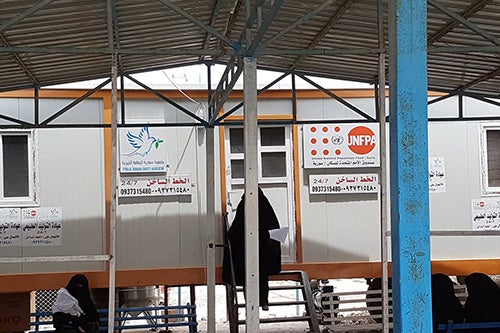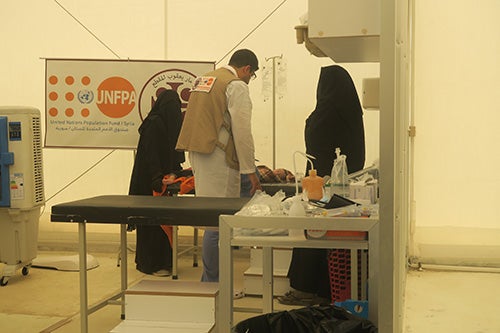News
After days on the run, pregnant Syrian woman finds safe haven and safe delivery
- 03 July 2019
News
AL HOL CAMP, Syria – “I never expected that I would be in this situation and suffer so much,” 18-year-old Khadeeja told a UNFPA health worker in the Al-Hol Camp in northeastern Syria, where some 75,000 people have sought refuge from the mounting tensions in their hometowns. More than 90 per cent of the camp’s residents are women and girls.
The conflict is intensifying in Khadeeja’s town of Hajin. She and her husband, Mahmoud, fled earlier this month, walking for days and nights with little food or water. Khadeeja in the final stages of pregnancy at the time.
“I have no home. I have lost everything. And now I have to give birth to my baby in a camp,” she said.

“We fled our homes and left behind all our memories and possessions, and we were barely able to carry any clothes on our backs,” Khadeeja remembered.
Her body grew frail during the treacherous journey to safety.
Eventually, they arrived in Al-Hol, where she was able to receive care at the new UNFPA-supported health facility. The facility is housed in a hospitainer, a 20-bed facility that opened on 2 June to meet the growing reproductive health needs in the camp.
On 13 June, she gave birth to a healthy baby girl named Fadia.
The health workers were concerned about Khadeeja’s health, but the delivery went smoothly.
“They saved my life and that of my beautiful baby girl,” said Khadeeja. She, too, had been afraid that her body could not withstand childbirth. “I feared the worst – that I would lose my baby and also die in the process. But now, Fadia and I are happy and grateful to be alive. We are safe and healthy.”
Fadia was the first baby to be born in the new health facility.

The health staff are working under trying conditions, with high demand for services. Between 5 and 26 June, nearly 13,000 patients were seen at the facility.
Fadia’s birth gave the health workers a reason to celebrate.
“We are happy to have delivered the first baby to be born in the new facility in Al-Hol camp,” said Mother Agnes-Mariam from the Monastery of Saint James the Mutilated, UNFPA’s partner in establishing and operating the hospitainer. “She is a lovely little girl and the parents are very happy and grateful.”
In Al-Hol Camp, the hospitainer has made care available to women who would otherwise be out of reach.
It is part of countrywide efforts to expand reproductive health care to women affected by Syria’s grinding conflict.
“We are trying to meet increasing humanitarian needs, which are overwhelming,” explained Karen Daduryan, UNFPA’s Representative in Syria. “UNFPA teams have been working to urgently scale-up sexual and reproductive health services with support from donors, including the European Commission Humanitarian Aid and Civil Protection, the Government of Australia, the United Kingdom’s Department for International Development, and assistance from the Syria Humanitarian Fund, which is a donors’ pool fund.
With this support, UNFPA is operating a variety of clinics, medical emergency teams, as well as women’s and girls’ safe spaces, and other services.
Still, Mr. Daduryan noted, “the needs remain high.”
– Kinda Katranji